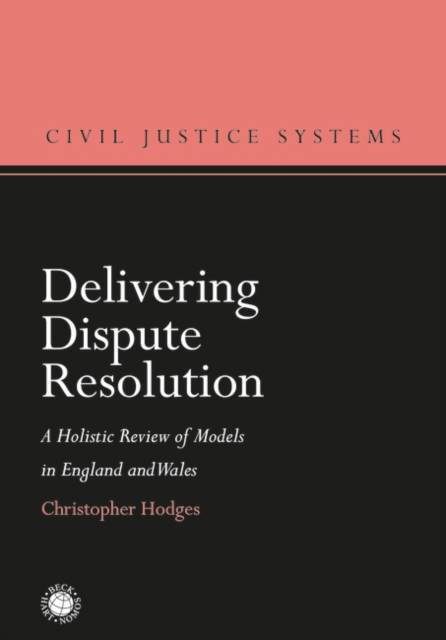
Bedankt voor het vertrouwen het afgelopen jaar! Om jou te bedanken bieden we GRATIS verzending (in België) aan op alles gedurende de hele maand januari.
- Afhalen na 1 uur in een winkel met voorraad
- In januari gratis thuislevering in België
- Ruim aanbod met 7 miljoen producten
Bedankt voor het vertrouwen het afgelopen jaar! Om jou te bedanken bieden we GRATIS verzending (in België) aan op alles gedurende de hele maand januari.
- Afhalen na 1 uur in een winkel met voorraad
- In januari gratis thuislevering in België
- Ruim aanbod met 7 miljoen producten
Zoeken
€ 194,95
+ 389 punten
Omschrijving
This book reviews the techniques, mechanisms and architectures of the way disputes are processed in England and Wales. Adopting a comparative approach, it evaluates the current state of the main different types of dispute resolution systems, including business, consumer, personal injury, family, property, employment and claims against the state. It provides a holistic overview of the whole system and suggests both systemic and detailed reforms.
Examining dispute resolution pathways from users' perspectives, the book highlights options such as ombudsmen, regulators, tribunals and courts as well as mediation and other ADR and ODR approaches. It maps numerous sectoral developments to see if learning might be spread to other sectors.
Several recurrent themes arise, including the diversification in the use of techniques; adoption of digital, online and artificial technology; cost and funding constraints; the emergence of new intermediaries; the need to focus accessibility arrangements for people and businesses that need help with their problems; and identifying effective ways for achieving behavioural change.
This timely study analyses the shift from adversarial legalism to softer means of resolving social problems, and points to a major opportunity to devise an imaginative and holistic strategic vision for the jurisdiction.
Examining dispute resolution pathways from users' perspectives, the book highlights options such as ombudsmen, regulators, tribunals and courts as well as mediation and other ADR and ODR approaches. It maps numerous sectoral developments to see if learning might be spread to other sectors.
Several recurrent themes arise, including the diversification in the use of techniques; adoption of digital, online and artificial technology; cost and funding constraints; the emergence of new intermediaries; the need to focus accessibility arrangements for people and businesses that need help with their problems; and identifying effective ways for achieving behavioural change.
This timely study analyses the shift from adversarial legalism to softer means of resolving social problems, and points to a major opportunity to devise an imaginative and holistic strategic vision for the jurisdiction.
Specificaties
Betrokkenen
- Auteur(s):
- Uitgeverij:
Inhoud
- Aantal bladzijden:
- 648
- Taal:
- Engels
- Reeks:
Eigenschappen
- Productcode (EAN):
- 9781509916894
- Verschijningsdatum:
- 3/10/2019
- Uitvoering:
- Hardcover
- Formaat:
- Genaaid
- Afmetingen:
- 170 mm x 246 mm
- Gewicht:
- 1260 g

Alleen bij Standaard Boekhandel
+ 389 punten op je klantenkaart van Standaard Boekhandel
Beoordelingen
We publiceren alleen reviews die voldoen aan de voorwaarden voor reviews. Bekijk onze voorwaarden voor reviews.









